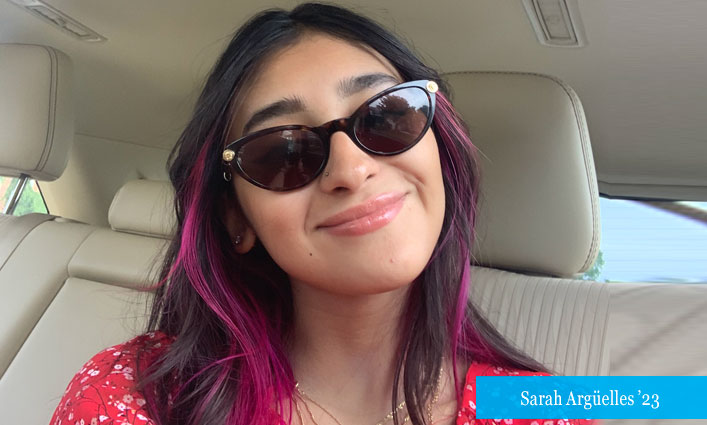
July is National Minority Mental Health Awareness Month. In an effort to explore the unique mental health struggles faced by members of racial and ethnic minorities in the United States, we held a roundtable discussion focused on BIPOC (Black, Indigenous, and people of color) students’ mental health experiences.
About Sarah…
Major: Forensic Psychology
Hometown: Long Island, New York
Current Role: President and Co-Founder of Latinx Honors Committee
Future Plans: Advocacy Work
What unique mental health struggles do BIPOC people face?
People of color tend to feel like they’re not enough—not American enough, good enough, smart enough, or pretty enough. As a second-generation immigrant, I have never felt like I can be my authentic self. When I go back home to Colombia, I’m a “gringa”—too white. But, in the predominantly white neighborhood I live in, I’m too Latina.
“I tried to bury any part of myself that made me unique. I felt like I couldn’t live up to white beauty standards.”
—Sarah Argüelles ’23
I remember growing up in Long Island, the beauty standard was to look white and that made me want to change so much about myself. I hated my nose—this nose that has been passed down for generations in my family. I wanted to get a nose job because I felt that my nose made me look too different. I tried to bury any part of myself that made me unique. I felt like I couldn’t live up to white beauty standards. It took a toll on my self-esteem.
How have you been able to overcome that struggle?
I’m finding ways to connect to my ancestral roots and regain confidence in myself. I’m making Colombian food, like arepas, with my mom. I’m learning more about my ancestors and have begun to appreciate my nose. I read self-help books, practice my spirituality, and go to the gym to power lift, which makes me feel strong. I’m starting to accept that I can’t change how others perceive me, but I can change how I feel about myself. Also, I’ve been going to therapy. Healing doesn’t look the same for everyone. It’s not linear. It gets messy but going through the process and overcoming your struggles is completely worth it.
How does attending John Jay—a Minority-Serving and Hispanic-Serving Institution—impact your mental health?
Coming to John Jay has been such a life-changing experience for me. It’s a diverse community that truly cares for others. In the Honors Program, our Latinx Honors Committee is a safe space for students to talk about their struggles and have those feelings validated. I also have great professors, like Dr. Ray Patton, who truly want their students to do well. He asks us how we’re doing and tells us we can speak freely about what we’re struggling with, and you know he means it.
“In the Honors Program, our Latinx Honors Committee is a safe space for students to talk about their struggles and have those feelings validated.”
—Sarah Argüelles ’23
Why do you think it’s important to observe National Minority Mental Health Awareness Month?
Being vocal about what we’re facing and what this month means gives BIPOC people the space to be vulnerable and talk about their struggles. As people of color, we’re told to be strong and push forward no matter what adversities or hardships we’re facing. We never give ourselves the space to breathe, take a break, or reflect on what we’re going through. Sharing our experiences will hopefully help others find the space to look at what they’re going through and seek help if needed.
Students can set up a confidential meeting with a trained mental health professional, free of charge, through our Wellness Center. Faculty and staff can access free, confidential, emotional health, and wellness services through the CUNY Work/Life Program.



